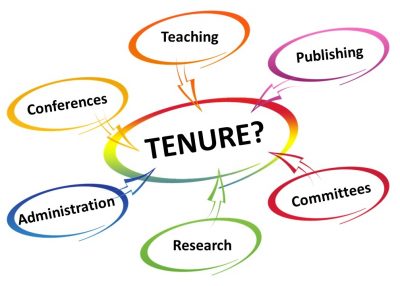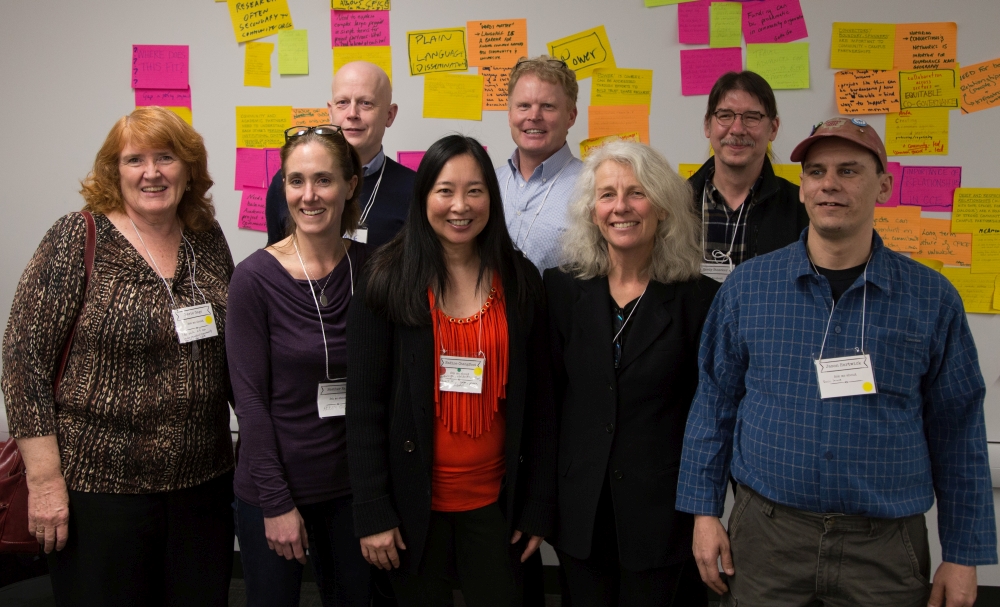In a CFICE article titled “5 Things You Should Know About Tenure in Canada and at Carleton”, we outlined what tenure is and how it works. In this follow up article, we look at how a professor’s tenure status can affect their involvement in community-campus engagement work.
by Kira Locken, CFICE Volunteer
Many PhD and post-doctoral students dream of becoming tenured. They dream of it, because being tenured means having a permanent job at a university. It means job security, benefits, funds for travel to conduct research and share it at conferences, and most importantly, the ability to commit to long-term projects without worrying about where the next paycheque is coming from.
 The road to becoming tenured is usually long and hard. There are papers to write and publish, grant applications to complete, committees on which to serve, conference presentations to give, administrative responsibilities to tackle, continuously innovating and renewing teaching practice, and more, usually all while working as an Adjunct or Sessional instructor (i.e. an underpaid, non-tenured professor often with a 60-70hour work week and multiple jobs to cobble together a living income).
The road to becoming tenured is usually long and hard. There are papers to write and publish, grant applications to complete, committees on which to serve, conference presentations to give, administrative responsibilities to tackle, continuously innovating and renewing teaching practice, and more, usually all while working as an Adjunct or Sessional instructor (i.e. an underpaid, non-tenured professor often with a 60-70hour work week and multiple jobs to cobble together a living income).
But what does tenure have to do with community-campus engagement? A lot, actually. And it largely comes down to the criteria needed to merit tenure.
Main factors in tenure process: Research and teaching successes
To get a sense of why tenure has such a huge impact on a professor’s ability to participate in community-campus engagement work, we need to understand how tenure is achieved, or more specifically, the criteria against which professors are assessed in order to merit tenure.
While universities differ in their review processes for tenure, most processes put an emphasis on a candidate’s contribution to their academic field, both as a teacher and a researcher.
At Carleton University, professors looking to receive tenure are judged based on five main criteria. These include a review of their credentials, what courses they have taught, their research, and their ‘service’ to the university and the wider community.
These criteria, and others, are outlined by Carleton University’s Academic Staff Association (CUASA) in their collective agreement with Carleton.
According to the ‘University Criteria for Tenure and Promotion’ on page 34 of this agreement, “It is generally accepted that contributions to teaching and scholarly studies should receive paramount consideration in any tenure or promotion decision but that recognition must also be given for valuable contributions to the university, for professional achievement, and for contributions to the community.”
What this means is that a professor’s research and teaching work carries the most weight when they are being considered for tenure.
The ‘value’ of community-campus engagement research to tenure committees
Tenure and promotion criteria, while useful in reviewing other forms of research, can often come in conflict when assessing community-campus engagement (CCE) work.
 According to Dr. Peter Andrée, associate professor and principle investigator of CFICE at Carleton, a candidate’s research is measured by the number of articles they have published in respected journals. Some disciplines, says Andrée, place highest value on articles authored by one individual.
According to Dr. Peter Andrée, associate professor and principle investigator of CFICE at Carleton, a candidate’s research is measured by the number of articles they have published in respected journals. Some disciplines, says Andrée, place highest value on articles authored by one individual.
In comparison, research reports or articles written as part of community-campus engagement projects are often published in lesser-known journals, or shared through websites, and are written by multiple authors.
“That takes a lot of effort to produce, on everyone’s part, but is not really ‘counted’ as a valid academic output by most tenure committees,” says Andrée.
For pre-tenure professors who deeply value CCE work (and who want a permanent job!), this may mean extra work writing and publishing additional articles in journals respected by their colleagues in order to merit tenure.
Further, gathering data and publishing research can take more time in community-campus engagement projects. This is because research is dependent on relationships between faculty and community partner organizations that can quickly change due to organizational turn-over, competing priorities, and relational difficulties. The added time it takes to do partnership-based research is not always understood by tenure committees.
Community engagement can count as teaching or service criteria
For professors who want to put their efforts into CCE work that will count towards tenure, teaching a course that requires community engagement can be an option. According to Andrée, these courses are considered quite demanding, particularly for professors who are new to the community. But they can be extremely rewarding for both students and professors.
While this effort is looked on favourably by tenure committees, “it won’t count for much if it means your research lags behind that of your colleagues,” says Andrée.
“Profs who do community-engaged teaching need to find ways to keep their teaching workload manageable,” he adds. “Some of my strategies have included inviting community partners to give guest lectures, and reducing the reading load in a course to compensate for the community engagement that I, the students, and partners are all involved in.”
Community-campus research can, at Carleton, qualify as ‘service’, provided it relates to the individual’s area of academic expertise. However, committees will not grant tenure based solely on this service, says Andrée. The collective agreement explicitly states that teaching and research are more important criteria.
Unfortunately, this emphasis on valuing certain types of research is not exclusive to Carleton.
Thankfully, tenure criteria is changing
 As part of its effort to support community-engaged scholarship (CES), the Community Environmental Sustainability Hub of CFICE in Peterborough-Haliburton, under the leadership of the Trent Community Research Centre, initiated an internal report in 2015 examining the enablers and barriers for faculty wishing to engage in CES.
As part of its effort to support community-engaged scholarship (CES), the Community Environmental Sustainability Hub of CFICE in Peterborough-Haliburton, under the leadership of the Trent Community Research Centre, initiated an internal report in 2015 examining the enablers and barriers for faculty wishing to engage in CES.
Some of the potential barriers experienced by faculty included a lack of suitable projects in the area, scheduling issues, the increased workload, and lack of understanding about community engagement and its relationship to research, teaching, and service criteria and tenure.
The three key aspects of CES, according to the Trent report, are community-based research, learning, and teaching, and service. These are similar to the research, teaching, and service criteria for tenure but are practiced and understood differently from non-CES in significant ways.
For example, at Carleton University, ‘service’ involves a professor providing consultations and/or collaborations that are relevant to the professor’s disciplinary ‘expertise.’ This means that professors may participate in ‘service’ as long as it relates to the academic discipline they are involved in. In comparison, CES is scholarship that results from a professor’s engagement with their local or regional community, regardless of which discipline they belong to.
Nadine Changfoot, associate professor in political studies at Trent University, CFICE investigator, and co-author of the Trent internal report says that another barrier for faculty is university culture and its view of community based research or CES.
“I think the culture of the university, even while it’s improving in valuing community-campus engagement, for untenured professors the value is yet to be fully appreciated,” says Changfoot.
One way these challenges can be overcome, continues Changfoot, is through research into various faculty experiences with tenure and CCE in order to determine how CES can be better understood and more fully valued in a university tenure process.

CFICE Community Environmental Sustainability (PBTO-HALIB) Hub team. L to R, Back Row: David Tough, Stephen Hill, Randy Stoecker. Front Row: Marie Gage, Heather Reid, Nadine Changfoot, Helen Knibb, Jason Hartwick.
An example of this type of research can be seen in the report, “Recognizing Excellence in Community Engaged Scholarship.” Published by the University of Victoria in April 2017, the report was developed to assist in peer review and evaluation of Community Engaged Scholarship. The impact rubric and guidelines contained in the report are based on a comprehensive literature review and empirical research conducted by the Office of Community University Engagement (OCUE) between August-December 2016.
According to Crystal Tremblay, who authored the report, “[It] encourages Faculties and Departments where faculty engage in CES, to consider its content in reviewing standards and policies applicable to hiring practices, merit evaluations, and promotion and tenure consideration.”
“This resource has been shared widely across the campus,” she continues, which speaks to the need for these types of resources at universities. “It is hoped that these resources help inform and strengthen guidelines for recognizing and rewarding engaged scholarship across the disciplines.”
By recognizing the value of community-campus engagement through the tenure and promotion process, universities will be able to make a greater contribution to the communities in which they exist.
As Tremblay notes, “It is time that institutions tackle this tremendous hurdle, if they want to be serious about their commitment to serving the public good.”
How to cite this article: Locken, Kira. (2018). “The Impact of Tenure on Community-Campus Engagement.”CFICE Connections Newsletter. January 29. https://carleton.ca/communityfirst/2018/the-impact-of-tenure-on-community-campus-engagement/
